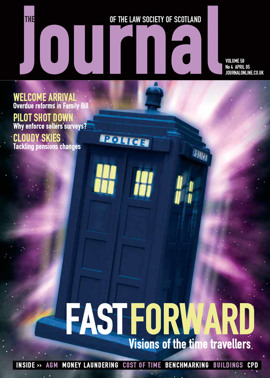Blueprint for the future

The much awaited Licensing (Scotland) Bill was published at the end of February. Based on the highly respected Nicholson Report, the bill sets out the basis for a radical reform of licensing law and procedure. For the first time, specific objectives are set out. These are: preventing crime and disorder; securing public safety; preventing public nuisance; protecting and improving public health; and protecting children from harm. These mirror the provisions of the English Licensing Act 2003, save the health issues, which are peculiar to Scotland. Whether and how an Act of the Scottish Parliament will be able to effect this worthy piece of social engineering remains to be seen.
A whole new ball game
The seven existing licence types will be abolished. There will be only one type of licence, known as a premises licence. In addition individual licensees will require a personal licence. Every set of premises will require to have an operating plan, to be approved by the licensing board. The operating plan will set out the permitted opening hours. No permitted hours are set out by statute. Approved trading times will be decided by the licensing board, but there is to be a presumption against 24-hour opening.
The licensing board system will remain, but administration will be very different. A board is to have no more than 10 members, with only three representing a quorum. Personal licences will last for 10 years. Premises licences will last indefinitely, but any variations will have to be approved by the board. There will be a licensing forum for each area. This will be permitted to make recommendations to licensing boards. The boards must have regard to these recommendations, and give reasons for any deviation from these. Licensing standards officers are to be appointed by each board to assist in administration and enforcement of the law. Conditions may be attached to an operating plan, and certain mandatory conditions are set out in the bill.
Battle of the binge
These include measures designed to combat the evils of “binge drinking”. This section of the draft had been awaited with considerable interest. The Nicholson Committee effectively sidestepped this issue. The report recognised there was a problem which required to be addressed, but came up with no particular solution. It discussed certain practices (such as “six for the price of five”), which it tacitly approved as normal and acceptable retailing. The bill is much more positive. It expressly outlaws “irresponsible drinks promotions”. These would include selling doubles for the price of singles, three for the price of two and the like. Alcohol pricing must be maintained for at least 48 hours, effectively putting a stop to the so called “happy hours”. Any promotion which relates specifically to an alcoholic drink likely to appeal largely to persons under the age of 18 (whatever that means) is deemed to be irresponsible.
Objections unlimited?
The bill contains bad news for those who run licensed shops on garage forecourts. The Executive is clearly opposed to them. Although they are not outlawed per se, premises “used primarily as a garage or which form part of premises which are primarily so used” will be “excluded premises” and prevented from having licences. It also contains remarkable provisions regarding objections. Nicholson recommended a fairly narrow definition of “competent objector”. The subsequent Daniels Report recommended this be broadened. Remarkably the bill provides that any person may object to an application, or indeed instigate a complaint about the running of licensed premises. There is a sanction of an award of expenses against an objector whose complaint is deemed frivolous or vexatious, but that is a fairly extreme test. Will we see Temperance movements involved up and down the land? Will trade associations, opposed to any new licences, be allowed carte blanche? Will large operators be allowed to gang up on smaller rivals by lodging complaints that they are trading outwith the terms of their operating plan?
Perhaps more importantly, there is as yet no clear indication as to how the transitional arrangements are to be dealt with, and whether holders of existing licences are to be guaranteed that their livelihoods will not be affected. Initial impressions are that the bill is well drafted. Its passage into the statute book and implementation are awaited with interest.
Tom Johnston, Partner, Young & Partners, Business Lawyers, Dunfermline and Glenrothes
In this issue
- Appropriate dispute resolution
- Retailers seek effective court action on crime
- Information and Consultation Regulations
- New identity for criminal justice body
- Spring in our step
- Continuing to develop CPD
- Future present
- Securing the future
- The right support
- A wealth of measures
- Paper-free at last?
- Adding the muscle
- Mark your card
- AGM report
- A seat with a view
- Drawing the line
- Milestones on a long road
- Jobs or birds?
- Safe as houses
- Blueprint for the future
- Scottish Solicitors' Discipline Tribunal
- Bail pilot takes off
- More tales from the Bar
- Book reviews
- Thin end of the wedge?
- Keeper's Corner
- The best laid plans
- PSG's green shoots






